7 Best VoIP Phone Service Solutions to Try in 2025
Explore the 7 best VoIP phone service solutions for 2025. Compare features, pricing, and benefits to find the ideal, cost-effective option for your business.
Redaction
19/09/2025, 12:30:00Is your business ready to transform its communications in 2025? As the demand for flexibility and modern tools grows, choosing the right voip phone service can be a game-changer for any company or individual. In this article, we reveal the seven best voip phone service solutions to try in 2025, exploring standout features, pricing, and benefits for each. Discover which options deliver reliability, cost savings, and innovative features to keep you ahead. Let us guide you through the top choices so you can confidently upgrade your communications this year.
What Is VoIP Phone Service?
Voice over Internet Protocol, or VoIP phone service, is a modern technology that enables voice calls to be made using internet connections instead of traditional telephone lines. Unlike legacy landline systems that rely on copper wires, VoIP converts voice signals into digital data and transmits them over broadband networks. This means calls can be made through computers, smartphones, dedicated VoIP desk phones, or even web browsers.
VoIP phone service uses various protocols, such as SIP (Session Initiation Protocol), to establish and manage calls. Devices can include headsets, IP phones, or software-based phones known as softphones. The main distinction from legacy PBX systems lies in the flexibility and digital nature of VoIP, which removes the need for expensive on-site hardware and allows for rapid deployment across diverse locations.
Definition and Basic Concept
A voip phone service operates by transmitting voice data as packets over the internet, rather than through analog signals on physical wires. This digital approach supports a range of devices, from classic handsets with network adapters to software applications on laptops and smartphones. VoIP relies on internet connectivity, so call quality and reliability are tied to network performance.
Traditional landlines and PBX systems often require substantial infrastructure and maintenance. In contrast, voip phone service solutions are managed via cloud platforms, making them easier to scale and update. This shift from hardware-based telephony to internet-driven communication is a fundamental evolution in how businesses and individuals connect.
Key Advantages of VoIP
Switching to a voip phone service brings several strategic benefits. The most immediate is cost reduction, as local, long-distance, and international calls are typically much cheaper than with legacy systems. Businesses can also scale their communications quickly, adding or removing lines without major investments.
Advanced features are another major draw. VoIP phone service providers offer tools like auto-attendants, call forwarding, voicemail-to-email, and mobile apps that empower teams to work flexibly. Integration with CRM and helpdesk platforms streamlines workflows and enhances productivity. The ability to operate from any location with internet access further increases business agility.
Common Use Cases
Voip phone service is widely adopted by small businesses seeking affordable communication solutions. Enterprises use it to unify communications across global offices, ensuring consistent service no matter where employees are located. Remote and hybrid teams benefit from the flexibility to make and receive business calls anywhere, supporting seamless collaboration.
Customer support centers and sales organizations leverage voip phone service features like call routing and analytics to optimize performance. Whether for internal collaboration or client-facing roles, VoIP adapts to a variety of business needs, making it a versatile choice for organizations of all sizes.
Growth & Market Trends (2024-2025)
The voip phone service market is experiencing rapid growth, driven by the rise in remote work, cloud adoption, and the need for flexible business communication. According to recent industry statistics, the global VoIP market is expected to reach $108.5 billion by 2032, reflecting strong momentum as companies transition from traditional telephony to digital solutions.
Demand for AI-powered features, enhanced security, and global connectivity continues to accelerate adoption. Businesses are looking for reliable, scalable, and cost-effective communication tools that support modern work environments. As the industry evolves, innovations in integration and automation are shaping the future of VoIP phone service.
How to Choose the Best VoIP Phone Service in 2025
Selecting the right voip phone service for your business or personal use in 2025 involves careful consideration of both technical and practical factors. With so many providers and features on the market, it is important to approach the decision methodically to ensure you get the best value and performance for your needs.
Core Evaluation Criteria
When comparing voip phone service options, focus on several critical areas:
- Pricing Models: Understand per-user, per-line, and bundled feature plans. Some services offer flexible billing, while others have fixed tiers.
- Call Quality & Uptime: Look for providers offering uptime guarantees and high-definition voice. Quality should be consistent across locations.
- Feature Set: Prioritize essentials like call routing, IVR, video conferencing, and business tool integrations. Explore detailed VoIP phone service offerings to compare available features.
- Mobility: Ensure support for mobile apps, softphones, and desk phones.
- Security: Check for encryption, compliance certifications, and fraud protection.
Evaluating these criteria can help you shortlist providers that align with your operational goals.
Factors to Consider for Different Users
The right voip phone service depends on your organization's size, structure, and use cases.
For small businesses, budget and ease of use are key. Look for scalable plans that offer straightforward onboarding and responsive support.
Enterprises often require advanced features, robust integrations with CRM or ERP systems, and international call capabilities. Consider global reach and the ability to support multiple locations.
Assess the need for integration with existing software, and evaluate the provider’s customer support and onboarding resources. International teams may prioritize global numbers and multi-language support.
Real-World Examples
Many organizations have already reaped the benefits of switching to a modern voip phone service:
- A small business reduced communication costs by 50% after transitioning from traditional lines.
- Enterprises leverage VoIP to enable seamless collaboration across offices in different regions.
- According to recent data, 80% of businesses cite flexibility as the main reason for adopting a voip phone service, empowering remote and hybrid workforces.
These examples underscore the measurable impact VoIP can deliver, from cost savings to enhanced collaboration.
Common Pitfalls to Avoid
When selecting a voip phone service, be mindful of these common mistakes:
- Overlooking hidden fees or long-term contract requirements.
- Failing to confirm compatibility with your current hardware and devices.
- Underestimating bandwidth needs, which can lead to call quality issues.
By proactively addressing these pitfalls, you can ensure a smooth implementation and maximize the value of your investment.
7 Best VoIP Phone Service Solutions to Try in 2025
Staying ahead in business communications means choosing a reliable voip phone service that matches your needs. In 2025, the market is more competitive than ever, and selecting the right solution can transform your workflow, customer experience, and bottom line. Below, we review seven standout providers, each offering unique features and strengths for businesses of all sizes.
VoIPStore
VoIPStore is a global leader in voip phone service, delivering enterprise-grade reliability and developer-focused solutions. The platform stands out with its unified API for SMS and VoIP, providing coverage in over 190 countries.
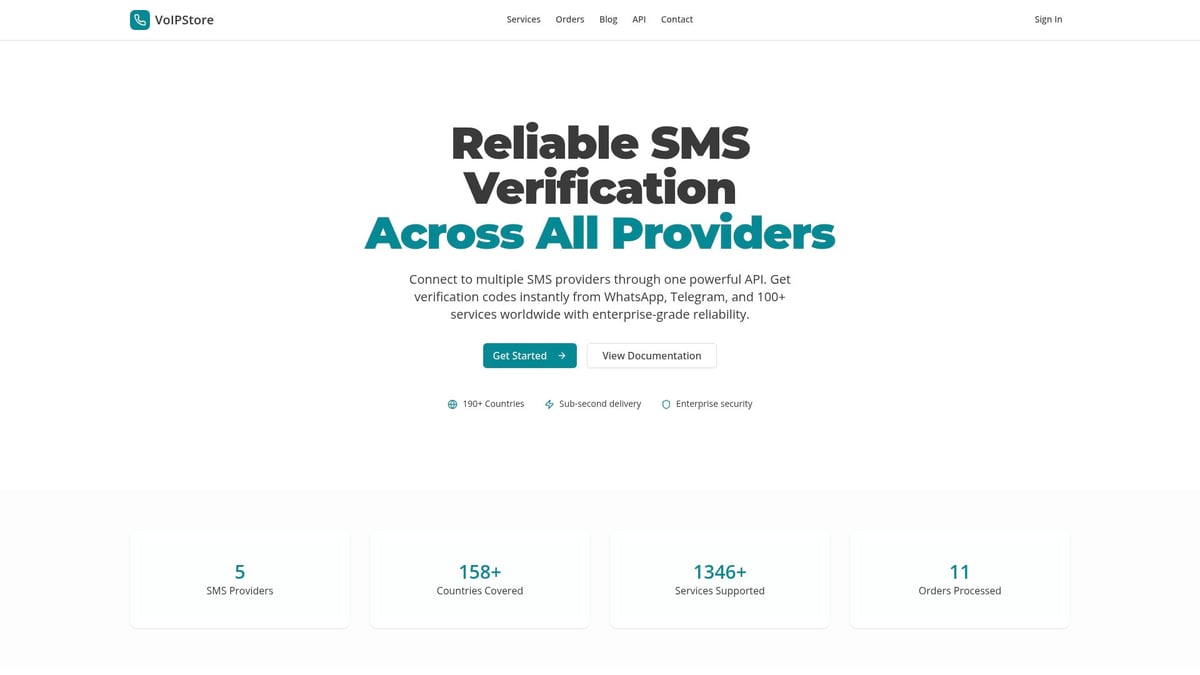
Key features include sub-second message delivery, real-time analytics, intelligent routing, and automatic failover. These elements ensure your communications are fast, secure, and operational at all times.
Pricing: Competitive regional pricing with custom quotes, making it ideal for businesses with variable needs.
Key Benefits:
- Lightning-fast verification and delivery
- Robust security with enterprise-level encryption
- Developer-friendly integration and documentation
- Cost optimization for high-volume usage
Target Audience: Developers, SaaS providers, fintech companies, e-commerce, and enterprises requiring scalable global communications.
Pros:
- Global reach
- Real-time analytics
- Dedicated developer support
- Powerful, unified API
Cons:
- Pricing details not public
- May require technical expertise for integration
Ideal Use Cases: Secure SMS verification, scalable customer communications, instant delivery for apps with global users.
VoIPStore is a top choice for organizations prioritizing API flexibility and worldwide reach in their voip phone service.
Nextiva
Nextiva is a recognized name in the voip phone service landscape, offering a well-rounded platform that combines voice, video, and messaging. With plans starting at $18.95 per user per month, Nextiva delivers unlimited calling, auto-attendant, and a powerful analytics dashboard.
Core Features:
- Unlimited US calling
- Team messaging and video conferencing
- CRM integrations
- Advanced analytics
Key Benefits:
- All-in-one unified communications
- High uptime and reliability
- Robust customer support
Target Audience: SMBs, enterprises, remote and hybrid teams.
Pros:
- User-friendly interface
- Detailed analytics for performance tracking
- Seamless CRM integrations
Cons:
- Some integrations cost extra
- Advanced features may require higher-tier plans
Ideal Use Cases: Businesses seeking unified communications, those needing analytics and CRM features to boost productivity.
With the voip phone service market expanding rapidly, as highlighted in VoIP market expected to reach $108.5 billion by 2032, Nextiva is positioned to support modern business needs.
Ooma Office
Ooma Office provides a straightforward, plug-and-play voip phone service for small businesses and home offices. Starting at $19.95 per user per month, Ooma offers a virtual receptionist, mobile app, and voicemail transcription.
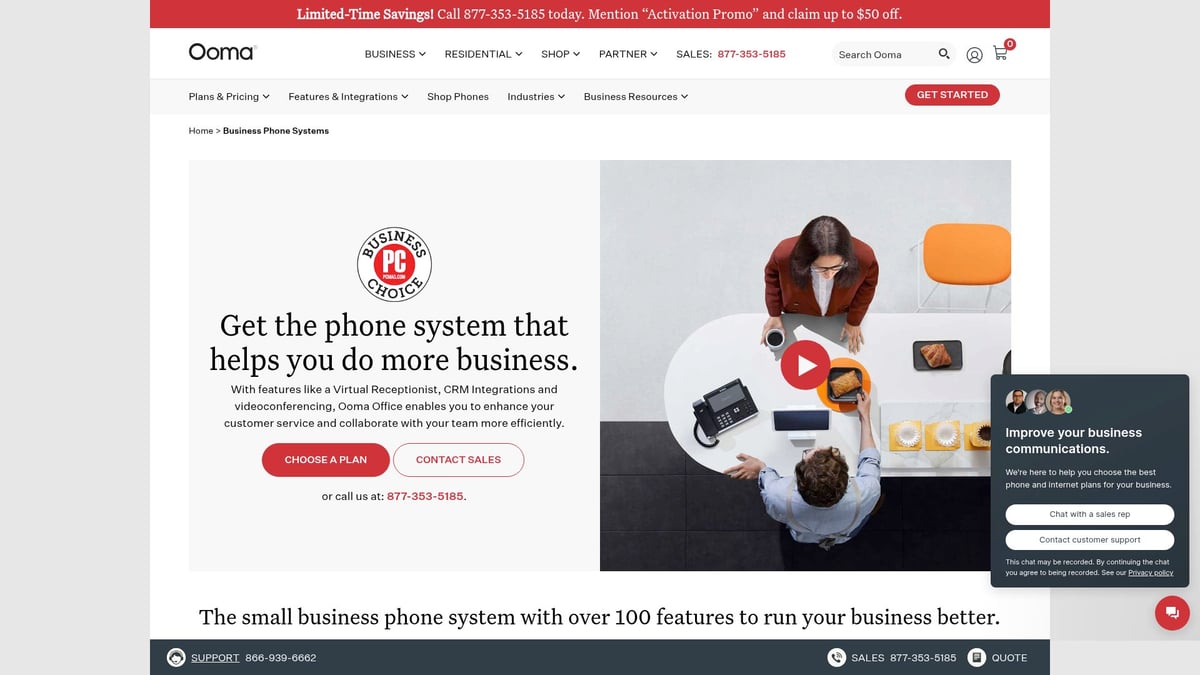
Core Features:
- Virtual receptionist (auto-attendant)
- Mobile and desktop calling
- Call forwarding and voicemail-to-email
Key Benefits:
- Easy setup with no contracts
- Reliable call quality
- Affordable entry point
Target Audience: Startups, home offices, and small businesses.
Pros:
- Simple onboarding
- High customer satisfaction
- Flexible mobile integration
Cons:
- Limited international calling
- Advanced features require Premier plan
Ideal Use Cases: Small businesses needing an affordable, low-maintenance voip phone service that gets up and running quickly.
RingCentral MVP
RingCentral MVP is known for its comprehensive unified communications platform. With pricing starting at $20 per user per month, it delivers unlimited calls and texts, video meetings, and deep integrations with Microsoft 365 and Google Workspace.
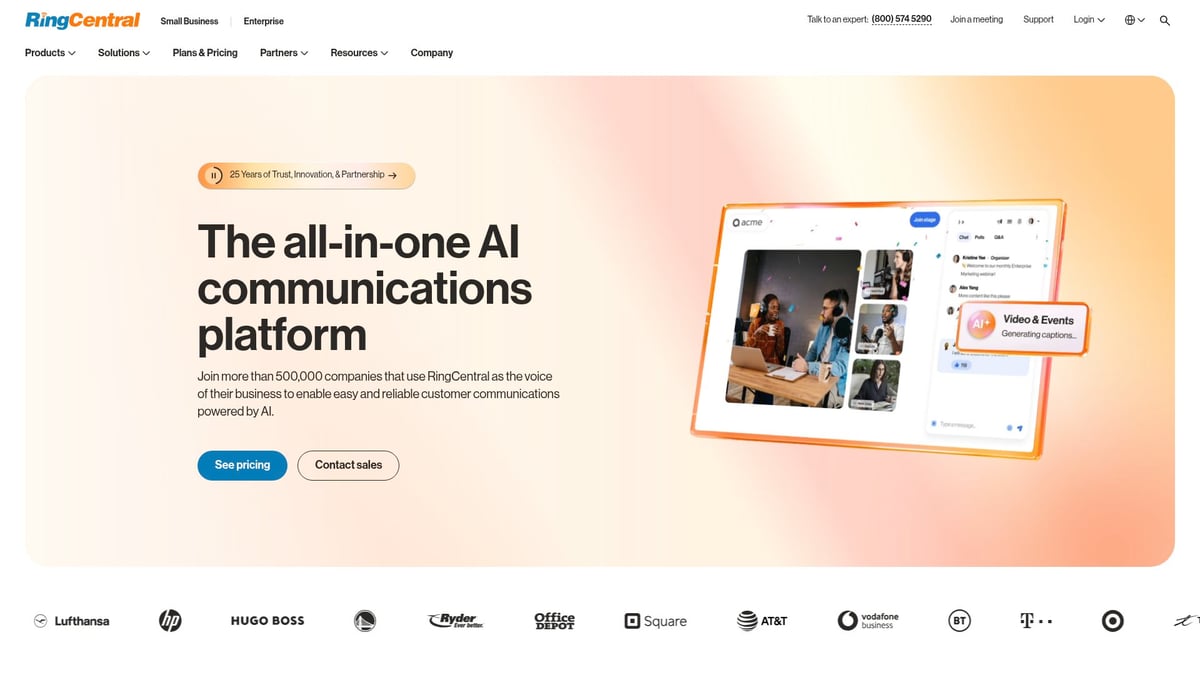
Core Features:
- Unlimited global calls and texts
- Team messaging and video conferencing
- Call analytics and reporting
- Wide range of business tool integrations
Key Benefits:
- Scalable for mid-sized to large enterprises
- Robust mobile and desktop support
- Reliable, global infrastructure
Target Audience: Distributed teams, mid-sized businesses, enterprises.
Pros:
- Feature-rich platform
- Strong international presence
- Extensive integration options
Cons:
- Learning curve for advanced features
- Higher cost for premium plans
Ideal Use Cases: Businesses operating across multiple locations, organizations needing deep integrations and reliable voip phone service for remote teams.
Grasshopper
Grasshopper is designed for entrepreneurs and small teams seeking a simple, mobile-first voip phone service. With flat-rate pricing starting at $29 per month, it offers virtual numbers, voicemail transcription, and business texting.
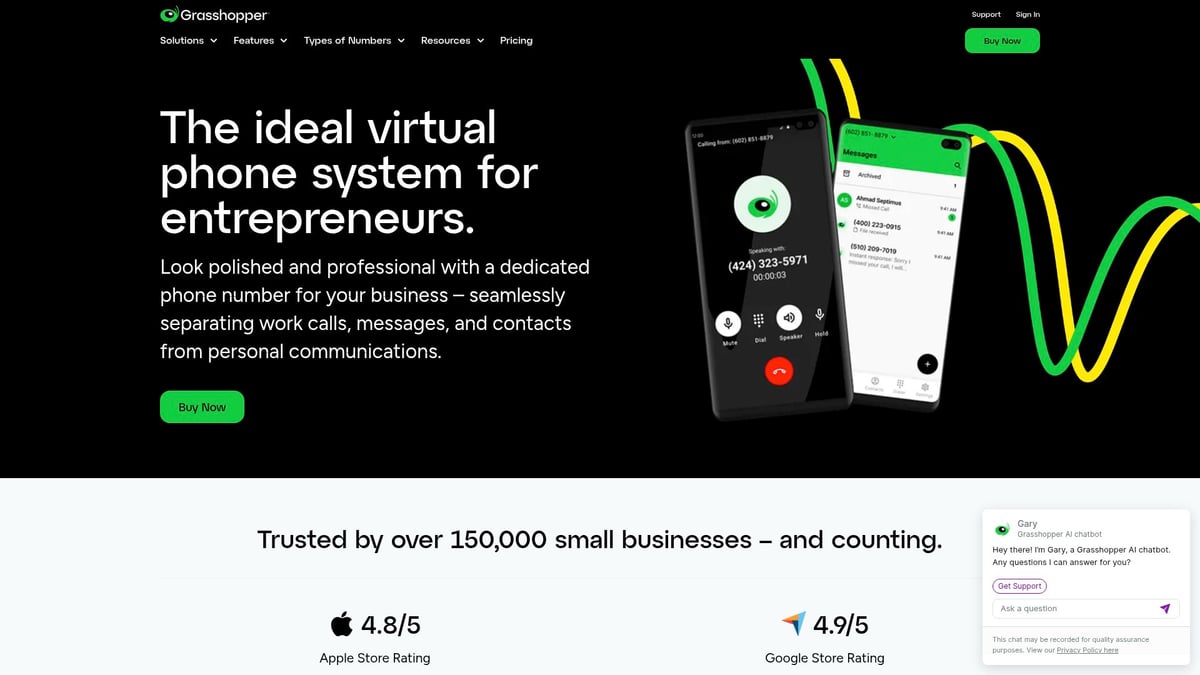
Core Features:
- Virtual phone numbers and extensions
- Mobile apps for calls and texts
- Voicemail-to-email
Key Benefits:
- No hardware required
- Professional appearance for small teams
- Simple, flat-rate pricing
Target Audience: Startups, solo professionals, freelancers.
Pros:
- Quick setup
- Easy to use
- US/Canada number support
Cons:
- Lacks advanced collaboration features
- Limited to North American numbers
Ideal Use Cases: Startups and solo entrepreneurs needing a professional business number and mobile voip phone service.
Vonage Business Communications
Vonage Business Communications offers flexible voip phone service plans starting at $19.99 per user per month. It excels in customizable solutions, international calling, and strong developer tools.
Core Features:
- Unlimited calling and SMS
- Video meetings and call recording
- App integrations and API access
Key Benefits:
- Flexible, customizable plans
- International support
- Reliable mobile/desktop apps
Target Audience: SMBs, global businesses, companies that need programmable communications.
Pros:
- Broad international coverage
- Developer-friendly APIs
- Customizable feature sets
Cons:
- Some features require add-ons
- Customer support quality varies by plan
Ideal Use Cases: Companies with global clients, businesses wanting programmable communications in their voip phone service.
8x8 X Series
8x8 X Series is a standout for affordable, global voip phone service with plans starting at just $15 per user per month. It combines unlimited calls, video meetings, team chat, and advanced analytics.
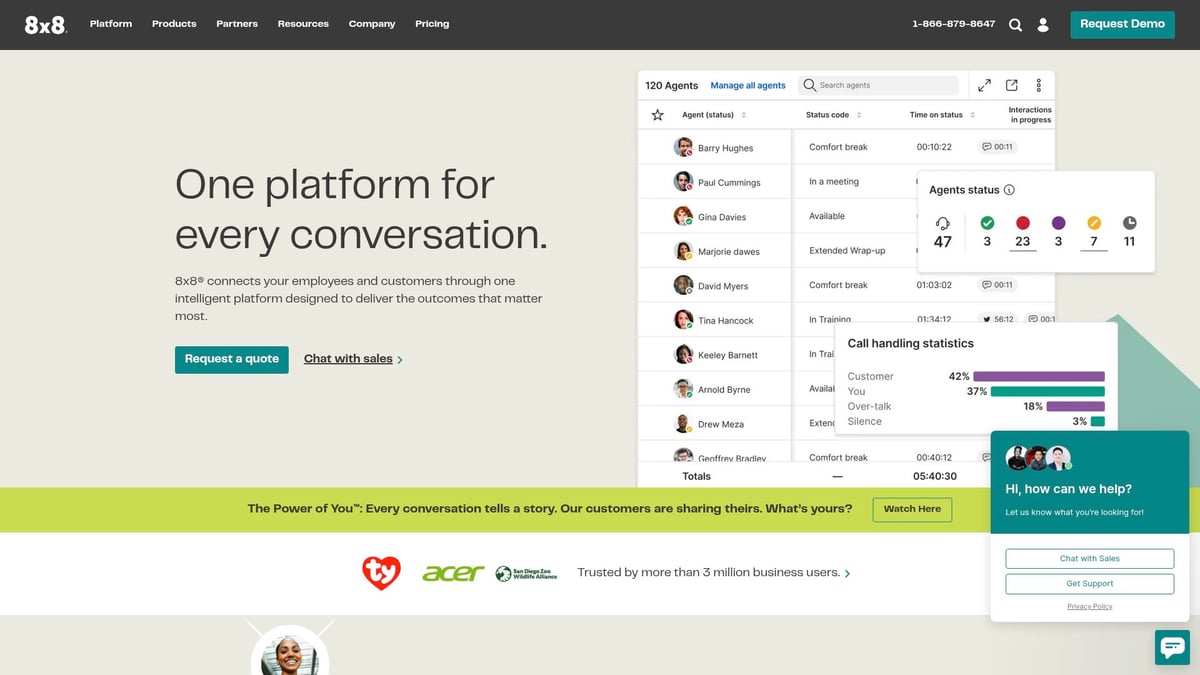
Core Features:
- Unlimited global calls
- Video conferencing and team chat
- Analytics dashboard
- Integrations with Salesforce, Microsoft Teams
Key Benefits:
- Global phone number availability
- Affordable entry-level pricing
- Strong analytics for performance management
Target Audience: SMBs, call centers, international teams.
Pros:
- Global reach
- Rich analytics
- Cost-effective plans
Cons:
- User interface less modern
- Features vary by plan
Ideal Use Cases: International businesses, call centers, and organizations seeking integrated voice and video in their voip phone service.
Side-by-Side Comparison Table
| Provider | Starting Price | Global Coverage | Best For | Key Features |
|---|---|---|---|---|
| VoIPStore | Custom | 190+ countries | Developers, enterprises | Unified API, analytics, security |
| Nextiva | $18.95/user/month | US, global | SMBs, enterprises | Unified comms, analytics, CRM |
| Ooma Office | $19.95/user/month | US/Canada | Small businesses, startups | Virtual receptionist, mobile app |
| RingCentral MVP | $20/user/month | Global | Mid-large businesses, remote teams | Video, messaging, integrations |
| Grasshopper | $29/month | US/Canada | Entrepreneurs, freelancers | Virtual numbers, texting, voicemail |
| Vonage | $19.99/user/month | Global | SMBs, global businesses | API, SMS, video, recording |
| 8x8 X Series | $15/user/month | Global | SMBs, call centers, intl. teams | Analytics, chat, integrations |
Each voip phone service reviewed here brings its own advantages, price points, and best-fit scenarios. By aligning your business needs with the right solution, you can harness the benefits of modern VoIP and set your organization up for growth in 2025.
Key Features to Look for in Modern VoIP Solutions
Choosing the right voip phone service requires understanding which features truly matter in 2025. Businesses demand more than just clear calls - they expect robust integrations, security, and intelligent automation. Let’s explore what sets modern solutions apart.
Essential VoIP Features in 2025
Modern voip phone service platforms deliver far more than basic calling. HD voice quality ensures every conversation is crisp, while noise reduction technology minimizes distractions. Multi-device support allows seamless switching between desk phones, mobile devices, and web apps.
Unified communications are now standard, bringing voice, video, messaging, and even fax into one interface. Advanced call handling features - like IVR, call queues, and recording - empower teams to manage high volumes efficiently. Security is paramount, with end-to-end encryption and multi-factor authentication protecting sensitive data.
AI-powered tools are fast becoming essential, offering transcription, sentiment analysis, and virtual assistants. Integration capabilities link your voip phone service with CRM, helpdesk, and other business platforms. Real-time analytics and reporting dashboards provide actionable insights, supporting data-driven decisions.
Examples from Top Providers
Many leading providers set themselves apart by offering innovative features that enhance the user experience. Nextiva’s analytics dashboard, for example, delivers real-time call performance tracking, helping businesses optimize operations.
Ooma’s virtual receptionist and mobile app offer easy management, even away from the office. RingCentral stands out with deep integrations into Microsoft 365 and Google Workspace, streamlining workflows across tools. 8x8 offers global phone number availability and robust call analytics, perfect for international teams.
Below is a quick comparison of standout features:
| Provider | Analytics | Integrations | Global Numbers | AI Tools | Security |
|---|---|---|---|---|---|
| Nextiva | ✔ | CRM, Analytics | Limited | ✔ | ✔ |
| Ooma | ✔ | Basic | No | ✔ | |
| RingCentral | ✔ | M365, Google WS | ✔ | ✔ | ✔ |
| 8x8 | ✔ | Salesforce, Teams | ✔ | ✔ |
When evaluating a voip phone service, compare these features to align with your business needs.
Trends and Innovations
The voip phone service landscape is evolving rapidly. Businesses increasingly demand AI-enhanced features and intelligent automation that streamline daily communication. Mobile-first and remote-friendly platforms have become the norm, supporting hybrid workforces worldwide.
A heightened focus on compliance and data security addresses the needs of regulated industries. The expansion of developer APIs is enabling more custom integrations than ever before. For a deeper dive into the latest advancements and market shifts, see Latest VoIP industry insights.
Staying current with these trends ensures your voip phone service investment remains future-proof and competitive.
VoIP Implementation Tips and Best Practices
Implementing a voip phone service successfully requires strategic planning, careful deployment, continuous optimization, and robust security. By following proven best practices, your business can achieve seamless communication, cost savings, and improved collaboration.
Planning and Preparation
Begin by evaluating your current network to ensure it can support the bandwidth needs of a modern voip phone service. Assess your internet reliability and consider upgrading if you plan to support multiple users or HD voice features.
Next, audit your existing hardware for compatibility with your chosen provider. Many solutions support both desk phones and softphones, but older devices may need replacing. Select a provider that offers strong onboarding and migration support to minimize disruption during the switch.
To streamline the process, use tools for VoIP account and service management to keep your service setup organized and efficient.
Deployment and Training
Once your voip phone service provider is selected, carefully configure call flows, IVR menus, and user permissions. Assign extensions and set up call routing to match your business’s workflow.
Invest in comprehensive training for your staff. Teach them how to use new features, mobile apps, and collaboration tools. Establish clear usage policies and a support protocol to help employees adapt quickly and reduce downtime.
Ongoing Optimization
After launching your voip phone service, regularly monitor call quality and collect user feedback. Use built-in analytics and reporting dashboards to identify trends and address any issues promptly.
Review call handling processes and adjust based on real-time insights. As your business grows, scale your service by adding users or features as needed. Continuous optimization ensures you maximize the benefits of your voip phone service investment.
Security and Compliance
Protecting your voip phone service begins with enabling end-to-end encryption and enforcing strong password policies. Update software and firmware regularly to address vulnerabilities.
Stay compliant with industry regulations such as HIPAA or GDPR if applicable. Leverage your provider’s security tools for threat detection and prevention. Training staff about security best practices further reduces risks and ensures your communication remains secure.
Real-World Success Stories
Businesses that follow these best practices often see transformative results. For example, companies have reported up to a 60% reduction in telecom costs after moving to a modern VoIP system. Others have improved customer satisfaction by leveraging advanced analytics and unified communication features.
Remote teams benefit from increased flexibility and productivity, while organizations with multiple locations achieve seamless collaboration. As the Global VoIP market projected to reach $270.05 billion by 2029 demonstrates, more businesses are embracing VoIP for its proven advantages.If you are ready to take your business communications to the next level after exploring the top VoIP solutions for 2025, now is the perfect time to experience the difference firsthand. With VoIPStore, you get reliable global coverage, lightning-fast SMS verification, and dedicated support, all tailored for teams and developers who value speed and security. Whether you want to streamline your communications or connect with customers worldwide, you can make the switch confidently. Let’s put these insights into action and see how modern VoIP can transform your workflow - Start now!